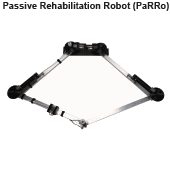
Loss of arm function is common after neurological injuries, such as stroke or cerebral palsy. Robotic devices that address muscle strength deficits in a task-specific manner can assist in the recovery of arm function; however, current devices are typically too large, bulky, and expensive to be routinely used in the clinic or at home. This study sought to address this issue by developing a portable planar passive rehabilitation robot (PaRRo) that uses passive actuators (i.e., brakes) to resist the user during reaching motions. The challenge in creating such a device is that including brakes into a conventional reaching robot design would result in a device that perturbs the user during reaching, instead of providing direct resistance. To resolve this issue, we designed PaRRo with a mechanical layout that incorporates kinematic redundancies, where the redundant linkages act to cancel out perturbing forces. Further, we utilized cost-efficient eddy current brakes to provide intuitive scalable resistances. The lengths of the robot’s linkages were optimized to have a large workspace to encourage reaching over the full range of motion. We then validated the robot’s resistive force generating capacity and workspace using MATLAB simulations and a human subject experiment. Our results indicated that the robot could produce sufficient end-effector forces for functional resistance training and the forces measured during the human subject experiment closely resembled our simulated models. Electromyography results indicated that the device was capable of providing adjustable resistances based on the subject’s ability levels, as muscle activation levels scaled with increasing magnet exposures. These results indicate that PaRRo is a feasible approach to provide functional resistance training to the muscles along the upper extremity. The proposed robotic device could provide a technological breakthrough that will make rehabilitation robots accessible for small outpatient rehabilitation centers and in-home therapy.

